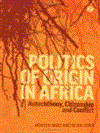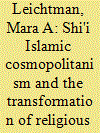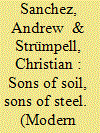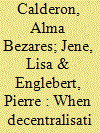|
|
|
Sort Order |
|
|
|
Items / Page
|
|
|
|
|
|
|
| Srl | Item |
| 1 |
ID:
090698


|
|
|
|
|
| Publication |
2009.
|
| Summary/Abstract |
This article argues for dissolving the civic-ethnic dichotomy into several analytical dimensions and suggests 'autochthony' and 'activism' as two such alternatives. It does so by first presenting a case study of Irish language revivalism and identity discourses in the North of Ireland, in which locals turn out to be both 'civic' nationalists and 'ethno'-cultural revivalists. The article then advocates treating these aspects as belonging to two distinct dimensions: the first is concerned with the causal logic underlying the reproduction of nationhood in terms of autochthony, while the second specifies different forms of activism aimed at (re)constituting the nation. Finally, reinterpreting the empirical case in terms of these two dimensions, it is shown that the type of activism is dependent on the specificities of 'threats' to the nation rather than on the underlying type of autochthony, which further substantiates the necessity to disambiguate the civic-ethnic distinction
|
|
|
|
|
|
|
|
|
|
|
|
|
|
|
|
| 2 |
ID:
178473


|
|
|
|
|
| Summary/Abstract |
This paper discusses the place-renaming policies in the recent two decades in Armenia. By elaborating on the legal and administrative framework for place-renaming in the country and through the analysis of more than 27,000 geographical names and their renaming practices, the paper focuses on the politics of space/place in Armenia in the context of a nation-state-building. By considering discourses, actors and institutions involved in place-renaming, the paper puts its results into the wider context of nationalism and nation-state-building. With a focus on the notion of raison d'état as a practice of governmentality, the abstract space of the nation-state conceived by experts and nationalist discourse on autochthony, the paper elaborates on the production of nation-state-space in Armenia. The contradictory aspects of place-renaming policies and the relations of exclusion and domination (re)produced in the process of conceiving of the nation-state-space in this country are discussed as well.
|
|
|
|
|
|
|
|
|
|
|
|
|
|
|
|
| 3 |
ID:
142183


|
|
|
|
|
| Publication |
London, Zed Books, 2013.
|
| Description |
viii, 149p.pbk
|
| Standard Number |
9781848139961
|
|
|
|
|
|
|
|
|
|
|
|
Copies: C:1/I:0,R:0,Q:0
Circulation
| Accession# | Call# | Current Location | Status | Policy | Location |
| 058406 | 320.6/BOA 058406 | Main | On Shelf | General | |
|
|
|
|
| 4 |
ID:
134222


|
|
|
|
|
| Publication |
2014.
|
| Summary/Abstract |
Senegalese "conversion" to Shi'i Islam resulted from cosmopolitan interactions with West Africa's resident Lebanese population and Iranian revolutionary ideologies. Shi'i advocates spread their religious convictions through teaching, conferences, holiday celebrations, and media publicity. Key to their success are libraries full of Arabic and French texts from Iran and Lebanon. Inherent in Islamic education is the authority bestowed on those who are knowledgeable, and with the spread of religious knowledge through books, media, and the Internet comes a broadening of the scope of religious authority and resulting conflict with or accommodation of old political communities. Senegalese converts to Shi'i Islam use their literacy in Arabic and individually acquired libraries of Islamic legal books to bypass the authority of Sufi marabouts. Some keep their feet in both Sunni and Shi'i worlds, and their ability to compare religious texts of both traditions wins them disciples. Shi'i minorities claim autochthony and authenticity in Senegal through narrating revisionist historical accounts of the spread of (Shi'i) Islam to Africa. Conferences commemorating the martyrdom of Imam Husayn during the Shi'i mourning period in the month of Muharram target Sufi Muslims who also love the family of the Prophet. Shi'i leaders skillfully detach this foreign religious ideology from Middle Eastern politics and make this branch of Islam relevant to Senegalese through establishing religious centers as NGOs, which work to bring health care and economic development to neighborhoods in the name of Shi'i Islam.
|
|
|
|
|
|
|
|
|
|
|
|
|
|
|
|
| 5 |
ID:
141076


|
|
|
|
|
| Summary/Abstract |
Inspired by E. P. Thompson's modelling of class as the contingent outcome of historical processes, this paper explores how autochthony and descent came to inform the boundaries of industrial workforces in the Indian steel towns of Jamshedpur and Rourkela. We suggest that if class is a historical object, then it relates to other forms of power and identity in ways that question the use of rigid analytic typologies. In the private sector Tata company town of Jamshedpur, an industrial working class was constructed during the late colonial period from labour migrants, whose employment became heritable within families. In the public sector Rourkela Steel Plant, founded in the mid-twentieth century, the politics of ethno regionalism coincided with state development policy to inform employment reservation for autochthons. Through a historical analysis of urbanization, migration and employment policy, we consider how elite workforces that bound themselves according to the principles of autochthony and descent were formed in the social laboratories of India's steel towns. We suggest that such processes demand a class concept that engages more subtly with the work of E. P. Thompson.
|
|
|
|
|
|
|
|
|
|
|
|
|
|
|
|
| 6 |
ID:
179295


|
|
|
|
|
| Summary/Abstract |
African regimes commonly use strategies of balanced ethnic representation to build support. Decentralisation reforms, often promoted in order to improve political representation and state access, can undermine such strategies. In this article we use the example of the DR Congo to show the extent to which the multiplication of decentralised provinces is upending a political system largely based until now upon collective ethnic representation in the state. Not only are Congo's new provinces more ethnically homogeneous than their predecessors, but many of them have also witnessed political takeover and monopolisation by the province's dominant ethnic group. In addition, the increased number of Congolese who now find themselves non-autochthonous to their province of residence heightens their vulnerability and the potential for local conflict. Decentralisation, whose intent was proximity to governance, might well end up excluding more Congolese from the benefits of political representation. The article uses original empirical evidence on provincial ethnic distributions to support its claims.
|
|
|
|
|
|
|
|
|
|
|
|
|
|
|
|
|
|
|
|
|